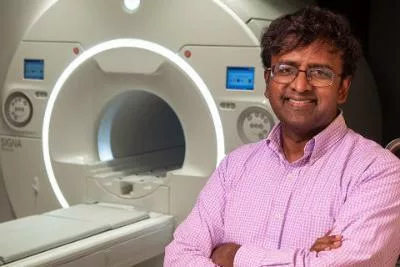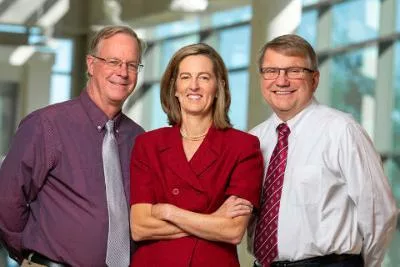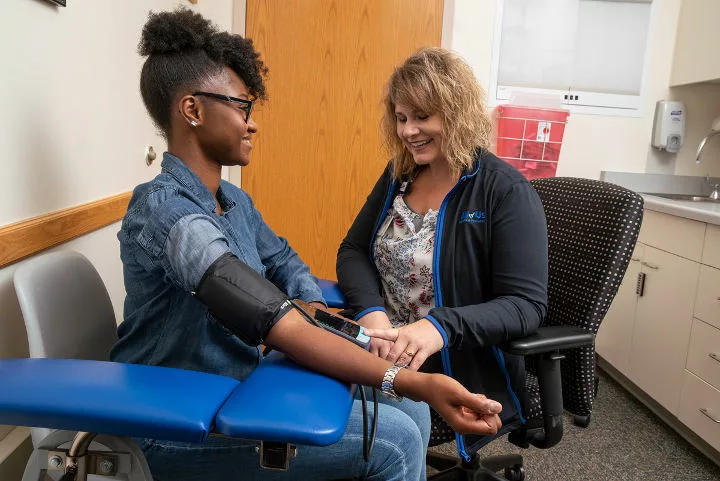In 2008, Vivek Prabhakaran, MD, PhD, had a vision for his research on post-stroke brain plasticity. He had joined the University of Wisconsin School of Medicine and Public Health as an assistant professor in the Department of Radiology. But even with his strong education — a medical degree from Stanford University and a residency and fellowship at Johns Hopkins Hospital — he needed much more to pursue his research.
Most of all, he needed time to immerse himself in his investigations. Thus, he applied for and received a National Institutes of Health (NIH) Institutional KL2 award from the UW Institute for Clinical and Translational Research (ICTR). He also received a pilot award from ICTR.
“Both of these grants were important in my career because they provided me with training in translational research, helped me learn how to successfully run a research program and mentor trainees, and showed me the power of team-based research,” he says.

The NIH KL2 grant allowed Prabhakaran to spend 75 percent of his time for nearly three and a half years investigating the brain networks of stroke survivors, an extension of research he started at Johns Hopkins. And the KL2 Scholars Program introduced him to a formal approach to grant writing, lab operations, mentorship and other skills he needed to become successful in translational medicine.
A vision to support researchers like Prabhakaran — with the goal of turning discoveries into health improvements — was behind the creation of ICTR in 2006. The institute is a collaboration among the UW Schools of Medicine and Public Health, Nursing, Veterinary Medicine and Pharmacy, the UW College of Engineering and the Marshfield Clinic Research Institute.
ICTR’s Inception
After 25 years on the Duke University School of Medicine faculty, Marc Drezner, MD, joined the School of Medicine and Public Health in 2000 as a professor of medicine and chief of the Endocrinology, Diabetes and Metabolism Division. In 2005, he became director of the UW General Clinical Research Center — one of approximately 60 NIH-funded centers that supported clinical research at U.S. academic medical centers.

In 2004, recognizing the need for a new research paradigm, the NIH developed the Roadmap for Medical Research, which — as part of its effort to spur clinical and translational research — established the Clinical and Translational Science Awards (CTSA) Program.
In 2006, Robert N. Golden, MD — the new dean of the School of Medicine and Public Health at that time — wanted to take the school’s incredible research discoveries to the next step, to directly impact patient care. When he learned about the CTSA Program, he immediately knew that he wanted Drezner, based on his distinctive leadership of the General Clinical Research Center, to guide the school toward the future of CTSA-centric activities.
“As a physician-researcher who moved his laboratory discoveries into clinical applications, Dr. Drezner had personally achieved the goals of the CTSA Program,” Golden notes. “Coupled with his considerable success as a senior leader in advancing science across the continuum, he was ideally suited for this enormous opportunity, as well as the challenges of making it happen.”
The developmental phase for this new concept began with the creation of ICTR, an effort initially supported — from 2006 through 2008 — by a grant from the Wisconsin Partnership Program for $5.25 million. This significant contribution reflected the school’s commitment to the aims of ICTR. During the initial year of funding, Drezner and other school leaders directed their efforts toward building the institute’s staff and identifying faculty members who would participate and direct the core activities that were destined for support from a CTSA grant. In addition, they dedicated many hours to planning the content and format of the grant application.
Drezner recalls, “Preparing the application for the first CTSA grant in 2007 was a herculean effort that was rewarded by its funding.”
Fast forward to 2012 and 2018, when Drezner again led the work for successful CTSA grant renewals, but with a much larger, more experienced team to produce the detailed applications.
In addition to the Wisconsin Partnership Program and NIH CTSA grants, funds from across UW–Madison — including support pledged by the UW–Madison chancellor and leaders of UW Hospital and Clinics and the UW Medical Foundation — helped bolster ICTR’s success. The Wisconsin Partnership Program continues to support ICTR through its strategic grants program.
Drezner points out another important factor: The timing of the institute’s establishment coincided with the school’s new vision—based on work by Golden and Philip Farrell, MD, PhD (PG ’72), the previous dean—to transform the school into the nation’s first integrated school of medicine and public health. As the school worked to integrate public health content into all of its programs, ICTR provided key components, including training of young investigators and the establishment of community-academic partnerships. ICTR leaders recognized the important role for these partnerships to inform research design and initiate conversations about translation and dissemination of discoveries into diverse settings.
“These efforts built ICTR’s successful community-engaged research programming that is the largest in the nation and includes an emphasis on collaboration and team science,” says Drezner, who became the first School of Medicine and Public Health senior associate dean for clinical and translational research. “ICTR is uniquely designed to include support for research teams that want to conduct innovative investigations in partnership with members of communities that often are underrepresented in research.”
To date, ICTR has conducted research programs in 58 of Wisconsin’s 72 counties, helping the school fulfill its mission to benefit residents statewide.
Success and Succession
When planning for Drezner’s July 2018 retirement, school leaders chose Allan Brasier, MD, as ICTR’s executive director and senior associate dean for clinical and translational research, due to his strong history of collaboration and forward thinking.

Reflecting upon the programs developed by ICTR between 2006 and 2018 and his past experiences, Brasier says, “I have a passion for translational medicine. Without this approach, work in laboratories can get locked there, and we need to continue to break down barriers and move discoveries from the bench to the bedside. Relying on team science is an important way to do this.”
Unlike research of years ago, in which individual investigators spent countless hours working on hypotheses in isolation, team science relies on researchers working in collaborative, often multidisciplinary, teams across a campus, state or nation.
“Papers from effective, interdisciplinary teams are cited more often, and patents are more likely to be licensed,” notes Brasier.
The founding ideal of the CTSA Program is something Brasier took to heart in his previous role as the director of the Institute for Translational Sciences at the University of Texas Medical Branch in Galveston, where he ran its CTSA Program.
“I see the diversity of discipline at UW–Madison as a great opportunity,” he says, referring to leading the university’s multi-school CTSA Program, within the campus’ massive research enterprise.
The foundation of team science is in place for Brasier to cultivate, notes Robert Lemanske, Jr., MD ’75 (PG ’80), professor, Departments of Medicine and Pediatrics, Division of Pediatric Allergy, Immunology and Rheumatology, and associate dean for clinical and translational research.
Drezner recruited Lemanske to become an ICTR co-deputy executive director in 2015 to oversee the Translational Workforce Development and Education Programs, which include the KL2 Scholars Program, as well as graduate programs in clinical investigation and predoctoral and postdoctoral TL1 Training Programs.
Lemanske says this role was a natural fit because his research has thrived for decades, and continues to flourish, under the tenet of team science. For instance, as early as the 1970s, in collaboration with UW School of Pharmacy researchers, he developed a rat model of virus-induced airway dysfunction; the results were translated into humans with the 1998 creation of the COAST (Childhood Origins of ASThma) birth cohort project. This research subsequently led to discoveries of how environmental and genetic factors impact asthma development in children. Lemanske’s current investigations have combined results from the COAST study with data from other birth cohort studies in the United States to further elucidate mechanisms of asthma inception in pediatric patients.
About ICTR, Lemanske notes that Drezner developed a “complex, integrated, well-oiled machine,” and Brasier spent a few months working alongside Drezner to learn its inner workings.
This transition time was particularly helpful due to ICTR’s size and success compared with other CTSAs, Drezner says, adding, “If we could have performed that Star Trek mind-meld, it would have been ideal.”
Mind-melding aside, Drezner points out that Brasier is drawing upon his abilities as a leader and mentor to grow and nurture the family environment that ICTR embodies.
Future Perspective
Team science remains among ICTR’s key components, as will an expanded emphasis on precision medicine and meaningful engagement of the health system, Brasier notes. With this in mind, the group recruited another ideal teammate in Elizabeth Burnside, MD, co-deputy executive director.
A nationally recognized breast cancer researcher with a master’s degree in medical informatics from Stanford University, Burnside became an associate dean for team science and interdisciplinary research at the School of Medicine and Public Health in 2018. She works with Umberto Tachinardi, MD, MSc — the school’s associate dean for biomedical informatics — to improve ICTR’s medical informatics enterprise and its partnership with the Marshfield Clinic Research Institute.
“My work with Dr. Drezner, my informatics background and my love of mentorship make me feel like this is a good fit,” says Burnside, professor, Department of Radiology. “Over the years, I’ve been a grateful recipient of many ICTR resources, including research awards, informatics support and career development training.”
For example, in 2015, when Burnside was invited to lead an NIH K12 training grant, “Building Interdisciplinary Research in Women’s Health,” she was charged with ensuring that ICTR resources were available to scholars. This gave her the opportunity to work closely with Drezner and other ICTR staff members and cemented her resolve to bring ICTR’s crucially important resources to investigators in women’s health and gender differences. She has appreciated Drezner’s guidance in her endeavors since then.
“The opportunity to step into a leadership role with ICTR — and to learn more about the organization’s research infrastructure — came at a great time,” she says. “I’m continually impressed by the depth of knowledge and expertise that has been cultivated by the research teams and ICTR program leaders, including those in education and training, patient engagement, informatics and other areas.”
With Brasier, Burnside and Lemanske at the helm, “the future is now for ICTR!” exclaims Drezner. “It entails taking what is here and expanding upon it.”
The new leaders plan to broaden ICTR’s reach as a national leader among CTSA programs, while continuing to serve as exceptional mentors for junior faculty members and implementing the All of Us Research Program.

Brasier also hopes to work with leaders of the Smart Institutional Review Board Program and the National Research Mentoring Network to facilitate continued growth; both of these programs were developed with substantial help from ICTR. Further, he plans to create a new ICTR strategic plan, develop new vision and mission statements, and establish training guidelines and best practices for CTSA programs around the nation.
Golden comments, “I applaud and endorse Dr. Brasier’s vision for pushing forward an ambitious agenda. His emphasis on team science is spot on.”
Returns on Investment
Back to Prabhakaran’s story, his involvement with ICTR has grown over the past decade. Due to the program’s early assistance and his dedication, he is now an associate professor who mentors junior faculty members and trainees. He has expanded his research program to investigate brain plasticity not only post stroke but also related to other diseases and conditions, such as epilepsy, traumatic brain injuries and Alzheimer’s disease. He also has gone on to receive numerous follow-up grants; for example, he is the principal investigator of NIH K23 and R01 grants and a co-investigator for several other federally funded studies.
Prabhakaran’s laboratory continues to translate this research and applies it to do pre-surgical brain mapping prior to resection of brain tumors and vascular lesions, and epilepsy surgery.
Reflecting on the initial NIH KL2 grant he received — which led to his team’s brain mapping discoveries — and the TL1 training support that has funded research by several of his graduate students, Prabhakaran says, “ICTR has been with me every step along the way. It is my second home at UW–Madison.”